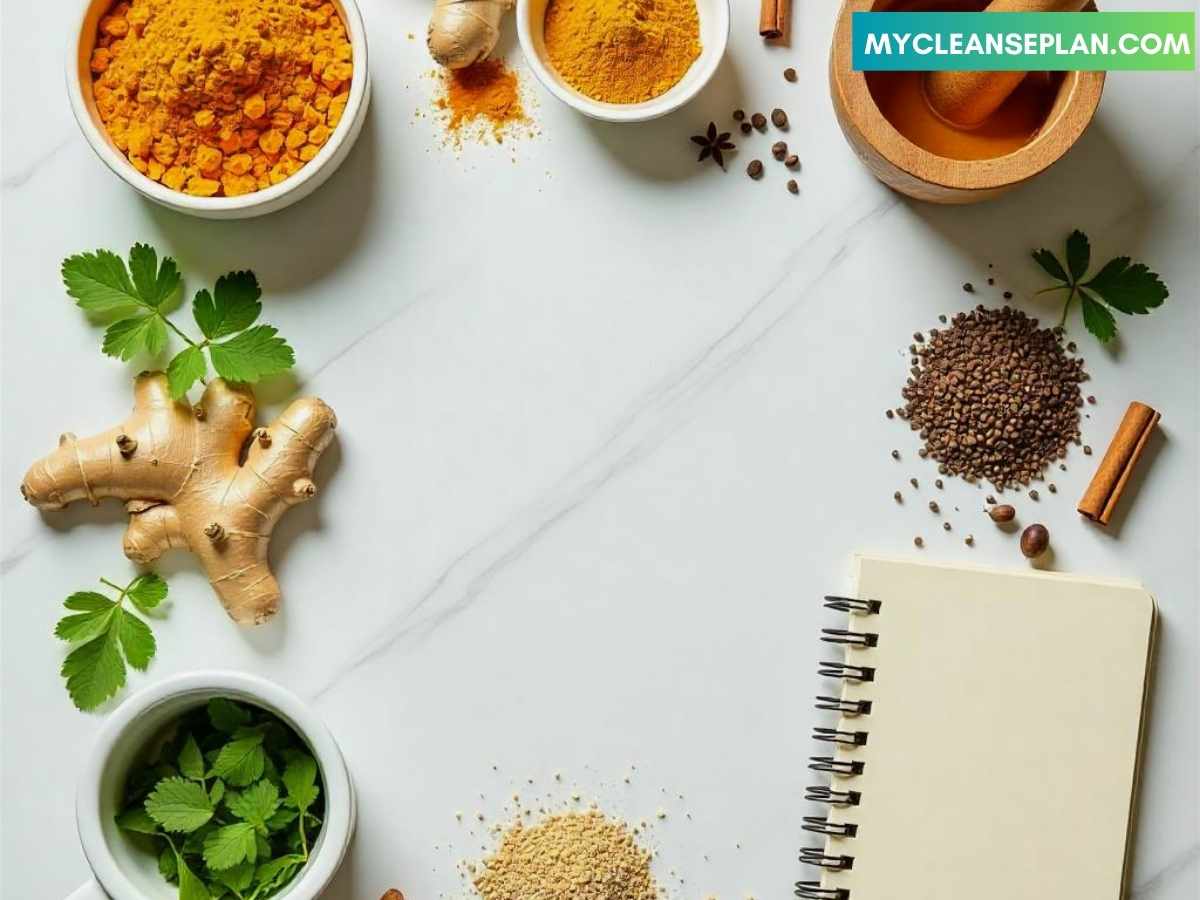My Top Gut-Boosting Herbs and Spices to Use Daily
I’ve had my share of digestive problems, but I found a solution. Adding certain herbs and spices to my daily routine changed everything.
They not only boosted my health but also helped with digestion. In this article, I’ll share my favorite gut-friendly ingredients that are easy to add to your daily life.
Exploring gut-boosting ingredients can help you manage your daily wellness and say goodbye to digestive issues.
I’ll share my go-to herbs and spices that have made a big difference for me. I hope they will do the same for you.

Key Takeaways
The Science Behind Herbs and Spices for Digestive Health
Herbs and spices do more than just add flavor. They play a big role in keeping our digestive system healthy. This is key for our overall health and well-being.

How Herbs and Spices Influence Gut Microbiome
Herbs and spices are more than just flavor enhancers. They deeply affect our gut microbiome. They contain prebiotic fibers that help in the growth of beneficial bacteria, supporting a healthy gut. For example, garlic and onions help grow good bacteria, improving gut health.

- Garlic: Known for its antimicrobial properties, it supports the growth of beneficial bacteria.
- Onions: Rich in prebiotic fibers, they aid in the proliferation of good bacteria.
Anti-inflammatory Properties and Digestive Benefits
Many herbs and spices have strong anti-inflammatory properties. These can soothe the digestive tract and reduce inflammation.
Turmeric, with its active compound curcumin, is a well-known anti-inflammatory agent that helps heal the gut lining. Spices like ginger and cinnamon also help with digestion.
“The use of herbs and spices not only enhances the flavor of food but also contributes significantly to our digestive health.”
Adding these natural remedies to our diet can greatly improve our digestive health. This, in turn, boosts our overall well-being.
Gut-Boosting Herbs and Spices You Can Use Daily
Using the right herbs and spices can greatly improve your gut health. I’ll show you the best ones to use. Knowing which herbs and spices are good for your gut helps you choose better foods.

What Makes an Herb or Spice “Gut-Friendly”
Herbs and spices are good for your gut if they help your stomach. They should have anti-inflammatory and antimicrobial effects. For example, ginger can help with nausea and improve digestion.
They also need to help keep your gut microbiome balanced. Some herbs and spices have prebiotic fibers. These fibers feed the good bacteria in your gut, keeping it healthy.
The Connection Between Gut Health and Overall Wellness
Your gut health is linked to your overall health. A healthy gut means a strong immune system and better digestion. It even helps with your mood and brain function.
Adding gut-friendly herbs and spices to your diet helps your digestion and overall health. This approach to health is effective and easy to keep up.
Incorporating These Powerhouses Into Your Diet
It’s easy to add gut-boosting herbs and spices to your meals. Start by adding them to your favorite dishes or drinks. For instance, add turmeric to your smoothie or peppermint to your tea.
Try new recipes and flavors to make meals fun and good for your gut. The important thing is to use these ingredients often and in creative ways.
Ginger: The Digestive Powerhouse
Ginger has been a key ingredient in cooking and medicine for ages. It’s great for your digestive system. I use it every day to keep my digestion healthy.

Historical Use and Modern Research
Ginger has been used for centuries to help with digestion. Today, science backs up its benefits. It contains compounds like gingerol and shogaol, which fight inflammation.
Research shows ginger can reduce nausea and improve digestion. It’s a great herbal supplement for digestive problems.
How Ginger Soothes Nausea and Promotes Digestion
Ginger’s compounds calm the digestive tract. They reduce inflammation and help digest food. This is good for people with nausea or indigestion.
My Favorite Ways to Use Ginger Daily
I use ginger in many ways every day. I make ginger tea, add it to meals, and take supplements when needed.
- Ginger tea: Steep fresh ginger in hot water for a soothing drink.
- Culinary use: Add sliced or grated ginger to your favorite dishes.
- Supplements: Use ginger capsules or tinctures for a concentrated dose.
Dosage Recommendations and Precautions
Ginger is usually safe, but watch your dose to avoid side effects. Aim for 250-500 mg per day.
| Form | Recommended Dose | Precautions |
|---|---|---|
| Fresh Ginger | 1-2 inches per day | May cause heartburn in some individuals |
| Ginger Supplements | 250-500 mg per day | Avoid if on blood thinners or have gallstones |
| Ginger Tea | 1-2 cups per day | Can be consumed freely, but monitor body response |
Turmeric and Curcumin: Golden Anti-inflammatory Support
Turmeric, known as the golden spice, is packed with curcumin. This compound is known for its anti-inflammatory effects and helps balance gut flora.
I’ve seen how turmeric improves my digestive health, and I’m excited to share its benefits with you.
The Science Behind Turmeric’s Gut Benefits
Curcumin, found in turmeric, is a powerful anti-inflammatory and antioxidant. Studies show it can improve the balance of gut bacteria, reducing inflammation and boosting gut health. This makes turmeric a great addition to a diet focused on gut health.

Enhancing Absorption with Black Pepper
One issue with turmeric is that curcumin isn’t easily absorbed. But, adding black pepper can solve this problem.
Black pepper contains piperine, which boosts curcumin absorption by up to 2,000%. This simple mix can greatly enhance turmeric’s benefits for gut health.
My Go-To Turmeric Recipes for Gut Health
Adding turmeric to my meals is easy with a few simple recipes. I love making a turmeric latte with turmeric, black pepper, and honey. I also add turmeric to soups and stews for extra anti-inflammatory benefits.
| Recipe | Ingredients | Benefits |
|---|---|---|
| Turmeric Latte | Turmeric, black pepper, honey, milk | Anti-inflammatory, digestive support |
| Turmeric Soup | Turmeric, vegetables, broth, black pepper | Anti-inflammatory, nutrient-rich |
Turmeric Supplements vs. Whole Spice
Turmeric supplements are convenient, but using the whole spice offers a more complete approach to gut health.
The whole spice has a mix of compounds that work together to support digestion. Supplements can be helpful if you find it hard to add turmeric to your meals. The best approach might be to use both whole spice and supplements.
In conclusion, turmeric and curcumin are key for gut health due to their anti-inflammatory properties.
Adding turmeric to your diet, either through cooking or supplements, and using black pepper to enhance absorption can greatly benefit your gut microbiome.
Fennel, Caraway, and Other Carminative Seeds
For centuries, people have used carminative seeds to ease digestive problems. These seeds, like fennel, caraway, anise, and coriander, help with digestion. They also lessen bloating and gas.
Fennel: The Ancient Bloating Remedy
Fennel seeds have been a key part of traditional medicine for their digestive benefits. They relax the muscles in the digestive tract, easing bloating and discomfort. I often add fennel seeds to my meals to help with healthy digestion.
Caraway: Traditional Digestive Aid
Caraway seeds have been used for ages in many cuisines, like European and Middle Eastern cooking.
They’re known for their ability to reduce gas and bloating. You can add them to bread, salads, or use them as a spice in dishes.
Anise and Coriander: Overlooked Digestive Helpers
Anise and coriander seeds are often not noticed but are strong digestive aids. Anise seeds have a sweet, licorice-like taste and soothe digestive issues. Coriander seeds have a warm, earthy flavor and are full of antioxidants that help with digestion.
How These Seeds Reduce Bloating and Gas
Carminative seeds release compounds that relax the digestive tract muscles and reduce inflammation.
This leads to less bloating and gas. Adding these seeds to your diet is simple, like putting them in meals or drinking teas made from them.
Creative Ways I Use Seed Spices Daily
I like to use these seeds in different ways. For example, I add fennel seeds to salads for a crunchy texture and digestive benefits.
Caraway seeds are great in homemade bread, and anise seeds make a calming tea. Coriander seeds add depth to soups and stews.
| Seed | Digestive Benefit | Culinary Use |
|---|---|---|
| Fennel | Reduces bloating | Salads, teas |
| Caraway | Aids digestion | Bread, salads |
| Anise | Soothes digestive issues | Teas, desserts |
| Coriander | Rich in antioxidants | Soups, stews |
Adding these carminative seeds to your daily meals can help with digestive health. It also reduces discomfort from bloating and gas.
Peppermint, Chamomile, and Calming Herbal Allies
Looking for natural ways to ease stomach troubles? Herbs like peppermint and chamomile are great. They’ve been helping with digestion for centuries.
Peppermint: Nature’s Digestive Soother
Peppermint is famous for easing digestive problems. Its menthol relaxes stomach muscles, easing IBS symptoms like bloating and cramps. I drink peppermint tea or add fresh leaves to my food every day.
Chamomile: Gentle Support for Sensitive Stomachs
Chamomile is gentle on sensitive stomachs. It has anti-inflammatory properties that calm digestive issues and support a healthy gut. I enjoy chamomile tea at night to relax and prepare my stomach for tomorrow.
Lemon Balm: The Anxiety-Reducing Gut Helper
Lemon balm is great for reducing anxiety, which can affect digestion. It calms the mind, helping the gut. I add lemon balm to my tea or use it in cooking for its soothing benefits.
Brewing the Perfect Digestive Tea Blend
Making a digestive tea blend is easy and customizable. Mix peppermint, chamomile, and lemon balm in different amounts. Start with equal parts and adjust to your liking.
When to Use Calming Herbs vs. Stimulating Spices
Knowing when to use calming herbs versus stimulating spices is key. Use calming herbs like peppermint and chamomile for stress or digestive issues. Stimulating spices are better for boosting digestion before meals or when you’re less active.
Adding these calming herbs to your daily routine can help your digestion and overall health.
Cinnamon, Cloves, and Warming Digestive Enhancers
Cinnamon, cloves, and cardamom are more than just tasty spices. They’re powerful digestive helpers that can change your gut health. These spices have been used for ages to help with digestion and health.
Adding these spices to your daily life can really help your digestion. Let’s look at the good they do for your gut health.
Cinnamon: Blood Sugar Regulation and Gut Health
Cinnamon helps control blood sugar, which is good for your gut. It keeps your gut microbiome healthy. I put cinnamon in my oatmeal or yogurt to start my day right.
Cloves: Antimicrobial Benefits for Gut Balance
Cloves fight off bad bacteria in your gut. This is key for a strong immune system and good digestion. I add cloves to my food, mainly in winter, for their benefits.
Cardamom: The Forgotten Digestive Aid
Cardamom is a strong digestive aid that’s often ignored. It eases bloating and aids digestion. I drink cardamom tea after eating to calm my stomach and help digestion.
My Daily Warming Spice Rituals
Using warming spices daily has greatly improved my digestion. I drink a warm cinnamon drink in the morning. After meals, I have cardamom tea. These habits have boosted my gut health and overall well-being.
By making cinnamon, cloves, and cardamom part of your daily life, you can actively support your digestive health. These spices are more than just flavor; they’re essential for a healthy gut.
Creating Your Personalized Gut-Healing Spice Cabinet
Building a spice cabinet for gut health is easy. Choose the right herbs and spices to boost your digestion and well-being.
Essential Herbs and Spices for Beginners
Beginners should start with the basics. Ginger and turmeric are great because they fight inflammation. Add them to your tea or soups for a simple way to improve your health.
Fennel seeds help with digestion, and peppermint soothes your stomach. These are must-haves for your spice cabinet.
| Herb/Spice | Benefit | Usage |
|---|---|---|
| Ginger | Anti-inflammatory | Tea, soups, stir-fries |
| Turmeric | Anti-inflammatory | Curries, soups, golden milk |
| Fennel Seeds | Carminative | Smoothies, salads, roasted vegetables |
Storage Tips for Maximum Potency
Keep your herbs and spices in a cool, dark spot. Use airtight containers to keep moisture out and preserve their quality.
Building Flavor Combinations That Heal
Try mixing different herbs and spices to boost flavor and health. For instance, ginger and turmeric together fight inflammation well.
My 3-Day Gut Reset Using Herbs and Spices
Here’s a 3-day plan to reset your gut with herbs and spices:
- Day 1: Drink ginger tea in the morning and add turmeric to dinner.
- Day 2: Add fennel seeds to your breakfast smoothie and use peppermint in lunch.
- Day 3: Make a curry with turmeric and ginger, and drink fennel seed tea before bed.
Follow this guide to make a spice cabinet that heals your gut. It will also make your meals more flavorful.
Transforming Your Digestive Health One Spice at a Time
Incorporating herbs and spices into your daily routine can greatly improve your digestive health. Ginger soothes, while turmeric fights inflammation. These natural ingredients help with digestion and reduce bloating and nausea.
Start by adding one or two ingredients to your diet. Try ginger in your morning tea or turmeric in your oatmeal. As you get used to it, mix different spices to find your favorites.
Herbal medicine can be a game-changer for your digestion. Simple changes can lead to a happier, healthier gut. You’ll soon feel better, with less discomfort and more energy.
FAQ Of My Top Gut-Boosting Herbs and Spices to Use Daily
What are some common gut-boosting herbs and spices that I can use daily?
Ginger, turmeric, fennel, caraway, peppermint, and cinnamon are great for your gut. They help with digestion and overall health.
How do herbs and spices influence the gut microbiome?
Herbs and spices help the good bacteria in your gut grow. They also reduce inflammation and balance your digestive system. This leads to better gut health.
Can I use herbal supplements instead of whole herbs and spices for digestive health?
Herbal supplements are helpful, but whole herbs and spices are better. They have more bioactive compounds that work together for better health.
How can I incorporate gut-boosting herbs and spices into my daily meals?
Sprinkle them on food, make teas, or add them to recipes. It’s easy to boost your digestive health every day.
Are there any precautions I should take when using herbs and spices for digestive health?
Yes, watch for allergies, drug interactions, and too much use. Always talk to a healthcare professional before big diet changes.
How can I store herbs and spices to maintain their potency?
Keep them in a cool, dry place, away from sunlight. Use airtight containers to keep their flavor and health benefits.
Can I use these herbs and spices if I have a sensitive stomach?
Yes, herbs like chamomile and peppermint are gentle. Start small and see how your body reacts.



![Gut & Skin Link Exploring the Microbiome's Role in Skin Health[1]](https://mycleanseplan.com/wp-content/uploads/2025/11/Gut__Skin_Link__Exploring_the_Microbiomes_Role_in_Skin_Health1-768x448.jpg)
![Gut Health 2026 Preview What New Research Suggests[1]](https://mycleanseplan.com/wp-content/uploads/2025/10/Gut_Health_2026_Preview__What_New_Research_Suggests1-768x448.jpg)
![Green Banana Flours and Gut Function Alternative Grains Explored[1]](https://mycleanseplan.com/wp-content/uploads/2025/10/Green_Banana_Flours_and_Gut_Function__Alternative_Grains_Explored1-768x448.jpg)
![The Gut Microbiome and Diet Diversity Cultural Lessons Explored[1]](https://mycleanseplan.com/wp-content/uploads/2025/11/The_Gut_Microbiome_and_Diet_Diversity__Cultural_Lessons_Explored1-768x448.jpg)